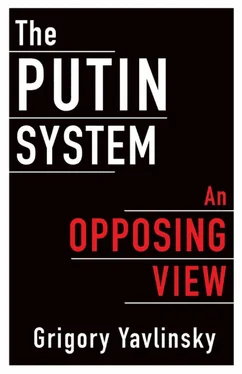Western democracies: corruption in, structural factors limiting, 106–7; declining interest in spread of democratic government, 143–44; effects on Russia of economic changes in, 10–11; high-level types of corruption in, 101–2, 106; loss of purpose and direction in, 10–11; Russian fear of political interference from, 95–96, 146, 210–11n7; Russia’s economic and psychological dependence on, ix, 134; as villain, in Russian ideology, 93–96, 210–11n7
Western European elections, Russian interference in, x, xii
Western institutions: resources for strengthening, xiv; weakening of, and vulnerability to Russian influence, xiii–xiv
Yabloko: author as founding member of, xv; gains in 2018 election, xvii–xviii; platform of, xv–xvii; protests against Syrian intervention, xvii; resistance to further consolidation of Putin’s power, xviii
Yanukovych, Viktor, 156
Yavlinsky, Grigory: experience with Russian system, ix; as founding member of Yabloko, xv; as presidential candidate in 2018 election, xviii, 196–97, 200–201; as presidential candidate in election of 1996, 34
Yeltsin, Boris: de facto control of government, 31; and election of 1996, xvi; and establishment of authoritarian system, 33–36, 37; and establishment of “successor to the president” position, 39, 168; loans-for-shares auctions, 34, 38; and post-Soviet fragmented power structure, 15, 16; showdown with legislature (1993), 31, 37, 168
Zyuganov, Gennady, 34

Columbia University Press
Publishers Since 1893
New York • Chichester, West Sussex
cup.columbia.edu
English translation © 2019 Columbia University Press
All rights reserved
E-ISBN 978-0-231-54882-3
First published in the Russian as Periferijnyj avtoritarizm: Kak i kuda prishla Rossija (Moscow: Medium Publishers, 2015).
Library of Congress Cataloging-in-Publication Data
Names:  vlinskiĭ, G. (Grigoriĭ), author.
vlinskiĭ, G. (Grigoriĭ), author.
Title: The Putin system : an opposing view / Grigory Yavlinsky.
Other titles: Periferiĭnyĭ avtoritarizm. English
Description: New York : Columbia University Press, [2018] | Includes bibliographical references and index.
Identifiers: LCCN 2018028372 | ISBN 9780231190305 (cloth : acid-free paper)
Subjects: LCSH: Russia (Federation)—Politics and government—1991– | Political culture—Russia (Federation) | Public administration—Russia (Federation) | Authoritarianism—Russia (Federation)
Classification: LCC JN6695 .I36813 2018 | DDC 320.947—dc23
LC record available at https://lccn.loc.gov/2018028372
A Columbia University Press E-book.
CUP would be pleased to hear about your reading experience with this e-book at cup-ebook@columbia.edu.
Cover design: Noah Arlow
This data is taken from Capgemini, The Wealth Reports , http://www.worldwealthreport.com. Accessed August 13, 2018.
Robert D. Putnam, Bowling Alone: The Collapse and Revival of American Community (New York: Simon and Schuster, 2000).
G. A. Yavlinsky, Rossiiskaia ekonomicheskaia sistema: Nastoiashchee i budushchee [The Russian Economic System: Today and Tomorrow] (Moscow: Medium, 2007). See also Grigory Yavlinsky, “Russia’s Phony Capitalism,” Foreign Affairs , May/June 1998; Sergei Braguinsky and Grigory Yavlinsky, Incentives and Institutions: The Transition to a Market Economy in Russia (Princeton, N.J.: Princeton University Press, 2000); and Grigory Yavlinsky, Realeconomik: The Hidden Cause of the Great Recession (and How to Avert the Next One) (New Haven, Conn.: Yale University Press, 2011).
See, for example, Grigory Yavlinsky, Periferiinyi kapitalizm [Peripheral Capitalism] (Moscow: EPIcenter, 2003); or Perspektivy Rossii: Ekonomicheskii i politicheskii vzgliad [Russia’s Prospects: An Economic and Political View] (Moscow: Galleia-print, 2006).
See, for example, my article in Voprosy ekonomiki [Economic Affairs] 9 (2007): 19–26.
Mancur Olson, Power and Prosperity: Outgrowing Communist and Capitalist Dictatorships (New York: Basic Books, 2000).
For an extensive if not an exhaustive list of such hypotheses, see, for example, Sergey Guriyev and Oleg Tsyvinsky, “ Ratio economica : Demokratichnyi krizis,” Vedomosti 161 (3175), August 28, 2012.
In the course of the twentieth century such authoritarian regimes, sometimes dubbed “developmental dictatorships” in Western literature, viewed themselves through the prism of their attempts to pull their countries out of economic backwardness and to try to catch up with the developed core of the world economy, or even to join it. The Soviet Union can apparently be considered one of those “developmental dictatorships,” at least at some stages of its historical trajectory.
Interview with Robert Aumann, Vedomosti 121 (3135), July 3, 2012; Daron Acemoglu and James A. Robinson, Economic Origins of Dictatorship and Democracy (Cambridge, Mass.: Harvard University Press, 2006); Acemoglu and Robinson, Why Nations Fail: The Origins of Power, Prosperity, and Poverty (London: Profile, 2012).
In the fall of 1991, I drafted an agreement on the economic union of the newly independent states—the former Soviet republics. That treaty envisioned the preservation of a joint currency, the establishment of a free trade zone, a joint customs control, continued cooperation among factories and firms of the former Soviet Union, harmonization of economic legislation across these countries, and other measures. The treaty was signed at the highest level of the Kremlin, with the participation of Mikhail Gorbachev and representatives of the leadership of thirteen out of fifteen former Soviet republics, including Ukraine and Kazakhstan (and with the exception of Azerbaijan and Georgia). The Baltic states also signed that treaty as observers. More than sixty rule-making acts needed for the implementation of this treaty were prepared and approved by the governments of the signatory states. However, the Belaya Vezha agreements on disbanding the union made it impossible to continue this work.
On a more general level, it is worth noting in this regard that the meaning of elections as a political institution greatly depends not only upon the integrity of electoral procedure, however important it is, but also upon the outcome of the elections—the character of the resulting change in the shape of power relationships. One possibility is that elections result in a limited but not a radical shift in these power relationships. That is, the side that wins the elections gets the opportunity to fill some government offices but does not obtain all power in its entirety; the losing party retains its power in other branches and at other levels of government, as well as their access to the media and the opportunity to successfully use the courts to challenge the decisions made by the winning party, among other things. But if the winner takes all without leaving anything to the defeated party, it is a different situation altogether. In other words, behind the seemingly uniform institution of elections, one can find fundamentally different principles of organization of power.
Читать дальше


 vlinskiĭ, G. (Grigoriĭ), author.
vlinskiĭ, G. (Grigoriĭ), author.










